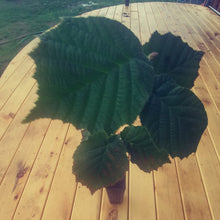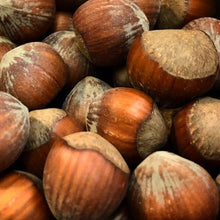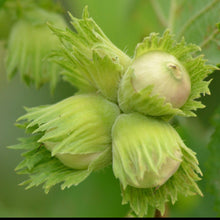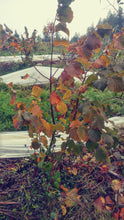
|
Mature height x width: |
approx 15' x 15' |
|
Recommended initial spacing: |
5'-10' in rows 20' apart |
|
Recommended final spacing: |
5' (hedgerow) / 10-20' x 20' (orchard) |
| Hardy to: | approx -35°C (-30) |
|
Preferred soil: |
deep loam |
|
Good for: |
riparian areas, partial shade, small garden, low-maintenance, high yield, storage |
|
Uses: |
oil, dessert, main dish |
Hazelnuts are productive, multi-purpose trees. Orchards prune to a tree form to maximize production, while shrubby hazelnuts are useful as windbreaks, privacy screens, hedgerows, erosion control, and living fences. Hazels can grow to 20+ feet, but they can also be kept significantly smaller with regular pruning or coppicing. They grow as an understory and forest edge tree in their native habitats, so they are tolerant of partial shade. For these reasons, they are an excellent choice for backyard growers without a lot of space. They are also grown commercially in this region, especially in Oregon. They are wind-pollinated so at least two trees are required. Plant densely to form a hedgerow or border at property line. Tolerant of wet soil as long as it drains in the spring (we've observed healthy trees in standing water during dormant months). Final spacing is highly variable depending on your goals. Space very densely (5') for a living hedge or privacy screen and thin or coppice as needed. Final orchard spacing is 10'-20 x 20'.
Genetics: This is a seedling of 'Faroka', a Turkish tree hazel hybrid developed at the Gellatly nut farm in Kelowna. While hazelnuts are generally suckering shrubs, Turkish tree hazel genetics may make these seedlings grow a bit more like a tree. While the blight-resistance of these trees is not guaranteed, 'Alex' is highly blight resistant and bud mite resistant. Faroka hybrids have been used in several breeding programs, so they have excellent potential.
Why seedlings? Growing seedlings from high-quality parents helps maintain diversity (each seed is a new variety) while drawing on some of the best genetics for hazelnuts in North America. In other words, by planting some of these seedlings, you are participating in the breeding new, regionally-adapted hazelnut varieties! In addition to variations in blight resistance, some trees may produce smaller or fewer nuts, so we recommend planting several of these trees closer together and selecting your final tree once they've produced their first nuts. Compared to clonally propagated treees, seedlings tend to have more robust root systems, increased vigour and drought-tolerance.
Why potted? If you won't be planting your trees right away and you don't feel sure about storing bare root trees then you want potted trees. Potted trees will allow you more flexibility with transplanting timelines and late spring installations, however, they are more expensive to produce and to ship.
Our nuts are grown in tree pots, which are designed with a large opening at the bottom to air prune the root. When the taproot reaches the bottom, instead of circling around, the opening enables the root to gently 'self-prune' itself, stimulating the growth of feeder roots further up.








